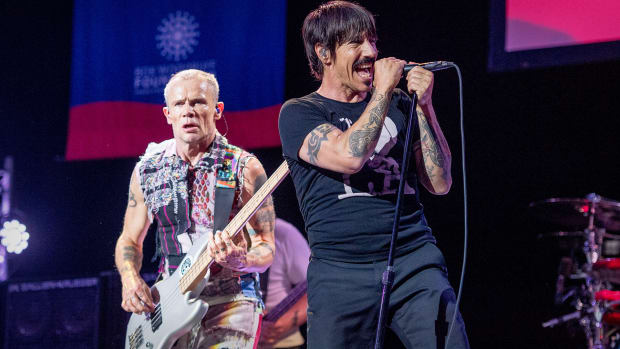Neil Diamond, iconic songwriter and the king of the blue jeans, is the latest artist to announce the sale of their back catalog, after reaching a deal with Universal Music Group for an undisclosed amount for his song catalog and recording rights.
It’s the latest high-profile, and presumably high-value (though the details weren't disclosed), deal for a veteran artist in recent months.
Universal (UMGP) recently bought the rights to Sting’s song catalog for roughly $300 million, Sony (SNE) bought the rights to Bruce Springsteen’s master recordings and music publishing rights for a deal estimated to be more than $500 million and also bough Paul Simon's catalog for an undisclosed amount.
Funk Gods the Red Hot Chili Peppers sold their song catalog to Hipgnosis Song Management for a deal said to be upwards of $140 million. Stevie Nicks, the White Witch herself, sold her catalog to Primary Wave for $100 million. Mötley Crüe sold their rights to BMG Rights Management for a reported $150 million, which is certainly something to shout at the devil about.
John E. Seay spent 10 years as a touring musician, touring manager and a music writer before he went to law school “specifically for entertainment law,” he says. “I was mostly doing music during that time, probably 80-85 percent music based.” Last year, he formed the firm Carter Woodard with two other entertainment lawyers.
He’s seen a lot of deals in his time, and says “it's an interesting moment right now with speculative valuation of music being very strong. It's a good time to cash in on these evergreen copyrights,” he explains. “And it's relatively low-risk, because those catalogs generate revenue, and it's a pretty steady revenue.
“And it's not going to be as affected by market forces,” he adds, “which is why some of the venture capital firms or retirement funds are buying interest in some of these assets right now.”
What Exactly Is Being Bought?
For most of this century, the music industry has largely been in tatters, as Napster and the rise of digital piracy devastated the profit base for record labels.
While artists were able to make money back through touring and merchandise sales, it was a much tougher time for the record labels, which had to resort to maneuvers such as 360 Deals, in which labels get a portion of all of an artists revenue stream, including merchandise and touring proceeds, in exchange for increased promotional support, or in the case of legendary record executive and Interscope founder Jimmy Iovine, they moved into selling headphones.
It should be noted, of course, that plenty of music fans and artists didn’t exactly feel sorry for the record labels’ woes. But be that as it may, once Spotify (SPOT) and Apple Music (AAPL) gained a foothold in the marketplace, the music industry slowly became profitable again.
Artists continue to complain about the low royalty rates from Spotify, and while it can certainly be argued that the services are not great for younger or “middle class” artists, streams for veteran artists with a high profile have been on the rise, seeing a big boom during the pandemic. According to The Atlantic, older songs now represent 70% of the U.S. music market, and that radio stations are putting “fewer new songs into their rotation,” and “completely ignoring new music in favor of old hits.”
While that’s not exactly good news for up-and-comers, it does represent opportunity for both investors and classic rock types. “I'm not convinced that the artist selling their catalogs and getting attention for doing so aren't making money from streaming,” says Seay. “I would look at The Beatles. They haven't been on Spotify that long, and I'm sure they have hundreds of millions of streams.”
Seay says the first big sale that kicked off this trend was Bob Dylan’s selling his songwriting catalog of more than 600 copyrights to Universal Music Publishing Group in late 2020 for a deal estimated to be between $300 million and $400 million. In January, Dylan also sold his recorded music catalog to Sony Music. “That was pretty eye-catching because he was someone who obviously has a huge catalog worth a lot of money.”
The main way that the new catalog owners will make money over time is through performance rights organizations such as ASCAP and BMI, which monitor airplay and collect payments.
Once a catalog is purchased, the new owner can potentially, with the artists’ permission, look for commercial placements and syncs in films and television, though Seay says that’s probably a secondary concern.

Roy Rochlin/FilmMagic via Getty Images
What’s In It for the Artists?
Some artists only choose to sell the copyrights to their record songs, so in that case, they could still get royalty payments from publishing if one of their songs was used in a commercial, even as the new owner would get most of the profits. When an artist also sells their publishing rights, they potentially are sacrificing future royalty payments, but they don’t necessarily have to sell 100% of their royalties, as many investors are eager to work with artists and can come to a deal.
Prince famously changed his name to an unpronounceable symbol because he felt he didn’t have control over his music. Taylor Swift is currently re-recording her back catalog, partly out of protest that the record executive Scooter Braun acquired and then sold her masters without her permission. But Seay says that for artists of a certain age, who once zealously guarded their publishing and back catalog, the thinking has changes in recent years.
“Sometimes you have twin forces at play. On one side, there’s artists talking about owning their copyrights and how important that is. But on the other hand, some artists are cashing in, which is really mostly older, legacy acts, because to get that level of money, you've got to have evergreen copyrights that are generating money year after year,” says Seay.
Seay also notes that there are tax benefits for the artist to sell early, as tax laws can change over time and this could be a way to not pay a higher rate down the line. “I had one business manager tell me something about how maybe there's some loophole that might be closed having to do with capital gains versus income tax, but that's really beyond my scope.”
Artists Retain Some Control
Springsteen rarely ever does commercials, and the Red Hot Chili Peppers don’t license songs for advertisements. Many artists, such as Springsteen, Dylan and Peppers, have overtly progressive politics, and may object to, say, their songs being licensed for certain political causes or politicians they object to. According to Seay, artists can negotiate for a veto power in how their music is used.
“It's really all just negotiation and bargaining power. I always, in every single publishing deal that I've ever done, put in approvals for certain categories of things,” says Seay. “We call them vice category, like alcohol, cigarettes, Triple X movies, you know, rated M video games. We do feminine products, political campaigns, things like that. And I think sometimes we can get full approval no matter what it is. So I'm sure that those artists have those in their contracts and those carried through in these big catalog sale deals as well.”
Besides approval, Seay says the main concern artists should have is making sure they are getting what they are worth. “I mean, they're losing out on the ability to sell the catalog again down the road or at least not for many, many, many years.
"So, you know, some artists may regret not getting those rights back. For nostalgic reasons they may not want some retirement fund or some big corporate conglomerate owning these compositions that they wrote,’ he says. “But I don't really see any downside provided that, you get market value.”
The Red Hot Chili Peppers famously “can't stop,” as they have a new album on the way as well as a summer stadium tour, and both Springsteen and Dylan continue to stay busy. (Springsteen’s fans are all but begging him to tour with the E-Street band again.) So these deals don’t necessarily indicate that these artists are looking to hang up the guitars right away, just that they are making plans for the future and getting in when the getting is good.







